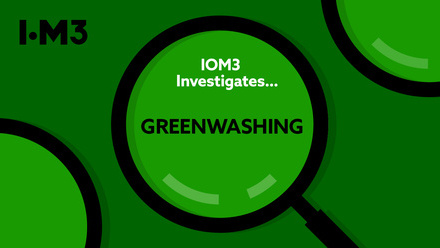Seeing green?
How false claims of being green can have hard consequences

Companies across industries have increasingly touted their eco-friendly credentials in response to growing consumer demand for sustainable products. However, as environmental claims proliferate, so do instances of greenwashing – the practice of giving a misleading impression of a company’s environmental efforts.
The term greenwashing was first coined in the 1980s by environmentalist Jay Westerveld, inspired by a hotel urging towel reuse to help the environment while expanding its resort
in environmentally harmful ways.
In essence, greenwashing refers to deceptive green marketing – making false, exaggerated, or unsubstantiated claims that a company’s products or practices are environmentally friendly when they are not.
It can range from vague statements like ‘eco-friendly’ or ‘all-natural’ on packaging without proof, to high-profile marketing campaigns that mask a polluting business model with token environmental gestures. There have been high-profile cases of companies being caught out, like the Volkswagen ‘dieselgate scandal’.
Disinformation misleads well-intentioned consumers and undermines trust. Regulators and watchdogs in the EU and UK are now cracking down on deceptive marketing, amid evidence that many green claims lack substance or truth.
European officials warn that unscrupulous firms “pull the wool over consumers’ eyes with vague, false or exaggerated claims”, harming both buyers and genuinely sustainable businesses.
The European Commission 2020 Study on environmental claims found that 53% of environmental claims were vague, misleading, or unfounded, and about 40% were completely unsubstantiated. A follow-up 2021 EU consumer authority investigation found 42% of ‘green’ claims online to be deceptive, likely violating consumer protection laws.
European lawmakers have responded to the greenwashing problem with new rules to ensure companies back up their green claims with facts.
The EU Greenwashing Ban (2022) regulates against generic environmental claims – words like ‘eco-friendly’, ‘green’ or ‘sustainable’ are outright banned unless companies can prove them with credible evidence.
While the EU Green Claims Directive (2023) asserts that any claim like ‘carbon neutral’, ‘plastic-free’ or ‘100% recyclable’ must be independently verified and scientifically substantiated before being used in marketing. Companies violating these rules face fines of up to 4% of their global turnover.
The UK has also strengthened its legal framework to combat greenwashing, requiring businesses to make truthful, verifiable and scientifically backed environmental claims. Authorities now have greater enforcement powers to penalise misleading sustainability claims.
- The Financial Conduct Authority (FCA) Anti-Greenwashing Rule (2024) – as of 31 May 2024, all FCA-authorised firms must ensure sustainability claims are clear, fair and not misleading to avoid regulatory penalties.
- The Competition and Markets Authority (CMA) Green Claims Code (2021) – businesses must provide evidence-backed and accurate green claims. The CMA has taken action against several corporations for misleading sustainability marketing.
- The Advertising Standards Authority (ASA) greenwashing crackdowns – the ASA has banned misleading ads from airlines, energy firms and fashion brands, requiring scientific proof for sustainability claims.
- Digital Markets, Competition and Consumers Act (2025) – from April 2025, the CMA can impose fines of up to 10% of global turnover for greenwashing without court approval.
These measures highlight the UK’s commitment to clamping down on deceptive environmental claims, with non-compliance leading to fines, legal action, and reputational damage.
In an attempt to clear up misconceptions, the steel industry is currently debating how to define ‘green steel’ – with major risks of greenwashing. Organisations like Responsible Steel and Worldsteel warn against using the term without clear definitions.
Some companies promote ‘green steel’ based solely on carbon offsets, rather than actual reductions in emissions. The European Steel Association (Eurofer) has cautioned against misuse of the term, emphasising the need for measurable carbon reductions in steel production rather than mere branding.
As both the EU and the UK tighten the screws on greenwashing, the takeaway for businesses is clear – environmental claims must be honest, precise and substantiated.
Companies that genuinely improve their environmental footprint stand to benefit from the greater trust these rules will foster. Meanwhile, those who continue to embellish or fabricate eco-credentials in their marketing will increasingly face legal consequences.
For consumers, the best defence against greenwashing is awareness. By demanding truthful, transparent and scientifically backed sustainability claims, shoppers can help push companies to walk the talk, not just talk the talk.








